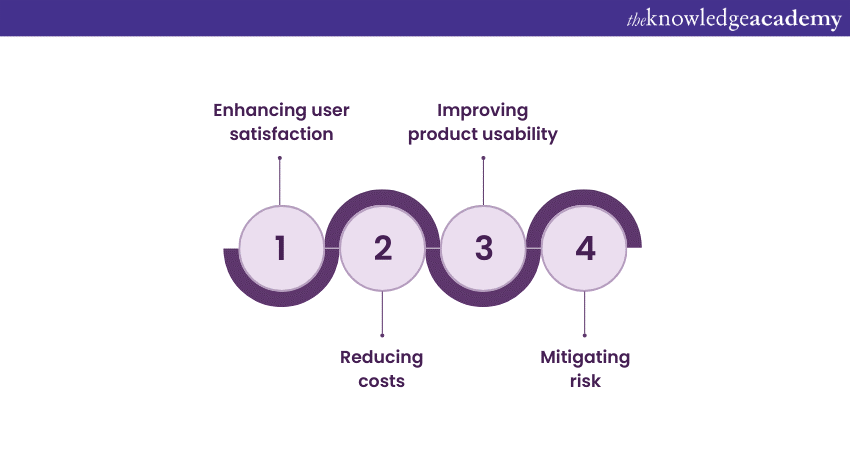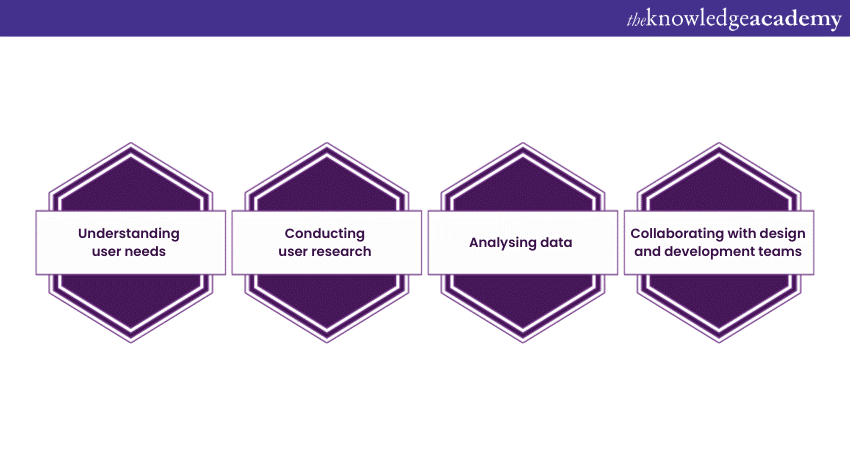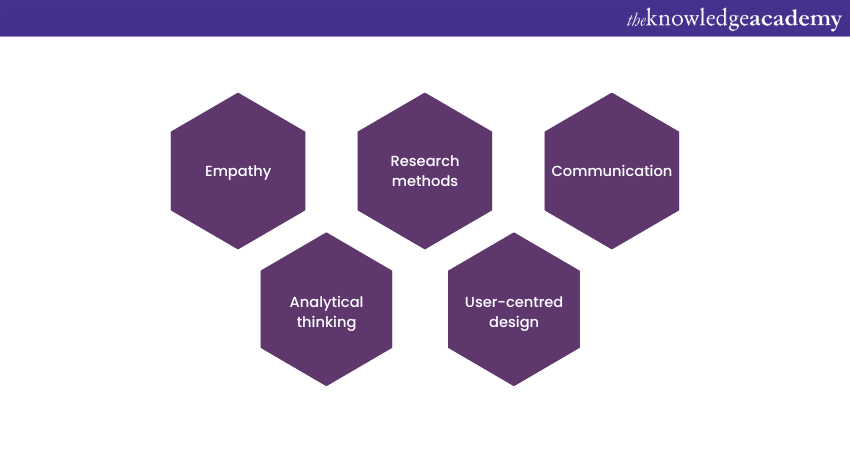We may not have the course you’re looking for. If you enquire or give us a call on +1 6474932992 and speak to our training experts, we may still be able to help with your training requirements.
Training Outcomes Within Your Budget!
We ensure quality, budget-alignment, and timely delivery by our expert instructors.

In the digital age, creating products and services that fulfil the needs and expectations of users is paramount. This is where User Experience (UX) research comes into play. Professionals involved in UX research these days are getting paid in droves, owing to the job title’s popularity. But who exactly is a UX Researcher, and what do they do? In this blog, we will delve into the world of being a UX Researcher to answer these questions comprehensively. So, keep reading to find out!
Table of Contents
1) What is UX Research?
2) The importance of UX Research
3) The role of a UX Researcher
4) Key skills of a UX Researcher
5) Requirements to be a UX Researcher
6) Challenges faced by UX Researchers
7) Conclusion
What is UX Research?
User Experience (UX) Research is a systematic and multidisciplinary approach to understanding and improving the interactions between users and digital products or services. It is a critical component of the product development process, aiming to create designs that are not only functional but also user-friendly and enjoyable.
UX Research involves a range of methodologies, including surveys, interviews, usability testing, and data analysis, all directed towards gaining insights into user behaviour, needs, preferences, and pain points. These insights inform design decisions and guide the development of products that align with user expectations.
In essence, UX Research serves as a bridge between users and design teams, facilitating the creation of digital experiences that are not only efficient but also engaging and satisfying. Its ultimate goal is to enhance user satisfaction, reduce costs, and mitigate risks, making it an indispensable practice in today's competitive digital landscape.
The importance of UX Research
UX Research is not just a buzzword; it's a fundamental component of the product development process. Its significance cannot be overstated, as it directly impacts the success of digital products and services in a highly competitive market. Here, we delve into why UX Research is indispensable:

Enhancing user satisfaction
At the heart of UX Research lies the goal of improving user satisfaction. By understanding user needs, preferences, and pain points, researchers can inform design decisions that lead to a more enjoyable and satisfying User Experience. When users are satisfied, they are likelier to engage with the product, recommend it to others, and remain loyal customers. High user satisfaction translates into increased user retention and, ultimately, improved business outcomes.
Reducing costs
Investing in UX Research early in the product development process can save significant costs in the long run. By identifying usability issues and design flaws before they reach the market, companies can avoid costly redesigns and mitigate the risk of product failure. Fixing usability problems post-launch is not only expensive but can also damage a brand's reputation. UX Research helps businesses get it right from the start, leading to cost savings and higher ROI.
Improving product usability
Usability is a core focus of UX Research. It involves evaluating how easily users can accomplish tasks within a product. By conducting usability testing and gathering feedback, researchers uncover areas where a product may be confusing, frustrating, or inefficient. Addressing these issues leads to a more user-friendly product that requires less effort to use, increasing user satisfaction and productivity.
Mitigating risk
Risks abound in the world of product development, from market competition to changing user preferences. UX Research acts as a risk mitigation strategy by providing data-driven insights. By understanding user needs and preferences, organisations can make informed decisions, reducing the risk of launching a product that fails to connect with its target audience. This research-driven approach minimises uncertainties and enhances the chances of success.
Unlock your creative potential and master UX/UI Design with our comprehensive UX / UI Design Jumpstart Training!
The Role of a UX Researcher
Before we delve deeper into the role of a UX Researcher, we will first define the role. A UX Researcher is a professional who conducts user-centric research to understand user needs, behaviours, and preferences, guiding the design and development of user-friendly digital products.
A UX Researcher's role is as multifaceted as it is critical to the success of any digital product or service. Their primary objective is to ensure that the end-user's needs, desires, and expectations are at the forefront of the design and development process. Let's explore in more detail the various aspects that constitute the role of a UX Researcher:

Understanding user needs
At the very core of UX Research lies the essential task of understanding user needs. Without this understanding, it's nearly impossible to create products or services that truly resonate with the intended audience. Here's how UX Researchers go about it:
1) User personas: Researchers create detailed user personas, which are fictional characters that represent varied segments of the user base. These personas encapsulate various demographics, behaviours, and motivations, helping the team empathise with and design for real users.
2) User journeys: Mapping out user journeys involves visualising the steps that a user takes when they are interacting with a product or service. This process uncovers pain points and opportunities for improvement in the user experience.
3) Contextual inquiry: To gain deeper insights, UX Researchers often conduct interviews and observational studies in the user's natural environment. This provides a more holistic understanding of how the product fits into the user's daily life.
Conducting user research
User research is the bedrock of UX Research. It involves the systematic collection of data and insights about users through various methodologies:
1) Usability testing: Researchers observe users as they interact with prototypes or existing products. This approach uncovers usability issues, reveals navigation challenges, and identifies areas where the user experience can be enhanced.
2) Surveys and questionnaires: By collecting feedback from a larger user pool, UX Researchers can obtain quantitative data regarding user preferences, satisfaction levels, and pain points.
3) Interviews: In-depth interviews with users provide qualitative insights into their thoughts, feelings, and behaviours when using a product. These interviews can uncover nuanced issues that may not be apparent through quantitative methods.
4) A/B Testing: This method involves comparing two or more variations of a product to determine which design elements or features are more effective in achieving desired outcomes.
Analysing data
Collecting data is just the beginning; the real value emerges during the data analysis phase:
1) Quantitative analysis: Researchers employ statistical techniques to sift through large datasets, identifying patterns, trends, and statistical significance. This quantitative data helps substantiate findings and make data-driven decisions.
2) Qualitative analysis: Qualitative data, such as interview transcripts, is meticulously analysed by coding and categorising responses. This process reveals themes and insights that guide design and development.
3) Data visualisation: Creating visually compelling charts, graphs, and reports simplifies complex data, making it more accessible to stakeholders. Visual representations often facilitate a clearer understanding of user behaviour.
Collaborating with design and development teams
UX Researchers are not lone wolves; they play a crucial role within a collaborative, cross-functional team:
1) User-centred design: By working closely with designers and developers, UX Researchers ensure that user needs are central to the design process. They help create user-friendly interfaces and guide the development of features that truly benefit users.
2) Prototyping and iteration: Researchers often assist in building prototypes and wireframes based on research insights. These prototypes allow for rapid iterations, refining the user experience iteratively.
3) Feedback loops: Establishing continual feedback loops among researchers, designers, and developers ensures that user feedback is consistently integrated into design and development decisions. This iterative approach results in a product that continuously evolves to meet user expectations.
Key skills of a UX Researcher
Being a successful UX Researcher demands a diverse set of skills that extend far beyond simply conducting interviews or analysing data. Here, we explore the key competencies that make a UX Researcher effective in their role:

Empathy
Empathy is the foundation of effective UX Research, requiring the ability to deeply connect with users on an emotional level. This skill empowers a UX Researcher to not just listen but truly understand the user's perspective. By putting themselves in the user's shoes, researchers can uncover hidden pain points and motivations that might go unnoticed otherwise.
Empathy allows them to ask probing questions during interviews, recognise non-verbal cues, and design research studies that resonate with the user's real-world experiences. This skill is indispensable for building trust with participants and advocating for user-centric design within the project team.
Research methods
A comprehensive knowledge of research methodologies is a UX Researcher's toolkit for gathering actionable insights. Proficiency in methods like usability testing, surveys, interviews, and ethnographic research is essential. Each method serves a unique purpose, and a skilled researcher knows when and how to apply them effectively.
For example, usability testing can uncover usability issues, while interviews delve into the user's motivations and goals. Understanding these methods allows researchers to select the most appropriate approach for a given research question, making sure that the data collected is relevant and meaningful.
Communication
Clear and effective communication is paramount for a UX Researcher. They must not only conduct research but also convey findings and insights to various stakeholders. This requires the ability to convert complex data into understandable narratives and actionable recommendations.
Whether presenting to designers, developers, or executives, a UX Researcher must adapt their communication style to resonate with the audience, ensuring that research findings are not only heard but also acted upon. Strong communication skills bridge the gap between research and design decisions, facilitating a user-centric approach to product development.
Analytical thinking
Analytical thinking is the skill that enables a UX Researcher to transform raw data into actionable insights. It involves the ability to examine data critically, identify patterns, and draw meaningful conclusions.
Researchers use analytical thinking to pinpoint usability issues, understand user behaviour, and make data-driven recommendations. This skill is especially valuable when dealing with large datasets, where the ability to discern meaningful trends amidst noise is crucial. Analytical thinking guides the decision-making process, helping teams prioritise design changes and improvements based on solid evidence.
User-centred design
User-centred design principles are at the heart of UX Research. A UX Researcher must grasp the fundamentals of design thinking, information architecture, and interaction design. This knowledge enables effective collaboration with designers and developers to ensure that the final product aligns with user needs and expectations.
Researchers help guide the creation of intuitive interfaces, seamless interactions, and accessible information structures. Their input ensures that design and development teams prioritise features and changes that enhance the user experience, resulting in products that not only meet business goals but also delight and satisfy the end-users.
In addition to these core skills, a UX Researcher should also possess qualities such as curiosity, adaptability, and resilience. They often encounter unexpected challenges and must be able to pivot their research approach when necessary. Furthermore, staying updated with the latest trends and technologies in UX Research is essential to remain competitive in the field.
Unlock the secrets of exceptional User Experiences - sign up for our User Experience (UX) Masterclass now!
Requirements to be a UX Researcher
Becoming a UX Researcher involves a combination of educational qualifications and practical experience. This section will outline the typical educational and professional pathways required to embark on a career in UX Research:
Academic background
The following are the academic requirements one needs to become a UX Researcher:
1) Bachelor's degree: Many UX Researchers begin their journey with a bachelor's degree in a relevant field. Common undergraduate majors include psychology, sociology, anthropology, Human-Computer Interaction (HCI), or a related social science or design discipline. These disciplines provide a solid foundation in understanding human behaviour and interaction.
2) Master's degree (Optional): While not always mandatory, a master's degree can significantly enhance your qualifications as a UX Researcher. Pursuing a master's in HCI, user experience design, or a closely related field can provide in-depth knowledge and research experience. This is particularly valuable for those aiming for senior or specialised roles within UX Research.
Professional development
The following are the professional requirements one needs to become a UX Researcher:
1) Practical experience: Practical experience is invaluable in UX Research. Many aspiring UX Researchers start with internships or junior positions in UX teams, where they can gain hands-on experience in conducting research, usability testing, and data analysis. This practical exposure helps bridge the gap between theory and real-world application.
2) Portfolio development: Building a portfolio of your work is crucial in the UX field. A well-documented portfolio should showcase your research projects, methodologies used, and the impact of your work on product design and development. It demonstrates your ability to apply research skills in practical scenarios.
3) Networking: Networking within the UX community is vital for staying updated on industry trends, job opportunities, and best practices. Attending conferences, joining UX-related associations or groups, and engaging with UX professionals on platforms like LinkedIn can help you create a strong professional network.
4) Certifications: Some UX Researchers choose to pursue relevant certifications to enhance their credibility and expertise. Certifications like the Certified Usability Analyst (CUA) or User Experience Professional (CUXP) can demonstrate your commitment to the field and knowledge of best practices.
5) Continual learning: The UX field is ever-evolving, with new research methods and technologies emerging regularly. Staying up-to-date through workshops, online courses, and attending seminars is essential to remain competitive and informed in your role.
Challenges faced by UX Researchers
While UX Research is a rewarding field, it comes with its fair share of challenges that researchers must navigate to deliver effective results. Here are some common challenges faced by UX Researchers:
Time and resource constraints
Meeting project timelines and working within resource limitations can be demanding. Conducting comprehensive research, recruiting participants, and analysing data require time and resources. Striking a balance between conducting thorough research and adhering to project schedules can be challenging.
Resistance to user-centred design
Not all stakeholders may fully embrace the principles of user-centred design. Convincing teams to prioritise user needs over other considerations, such as business goals or personal preferences, can be an ongoing challenge. Building a strong case for user research is crucial.
Maintaining objectivity
Remaining impartial during research is vital to avoid biased results. Researchers must consciously set aside their own assumptions and beliefs to ensure accurate findings. This requires self-awareness and rigorous research methods.
Keeping up with technology
The rapid evolution of technology introduces new devices, platforms, and interaction paradigms. Staying up-to-date with these changes and adapting research methodologies can be challenging but is essential to remain effective in the field.

Conclusion
To sum it up, a UX Researcher serves as the bridge between users and digital product development, wielding a toolkit of empathy, research methods, communication, analytical thinking, and user-centred design. Their role is pivotal in enhancing user satisfaction, reducing costs, improving product usability, and mitigating risks. Despite facing challenges, UX Researchers remain indispensable in the quest to create exceptional digital experiences that delight users and drive business success.
Unlock your potential in App and Web Development with our expert led App and Web Development Training!







 Top Rated Course
Top Rated Course



 If you wish to make any changes to your course, please
If you wish to make any changes to your course, please


